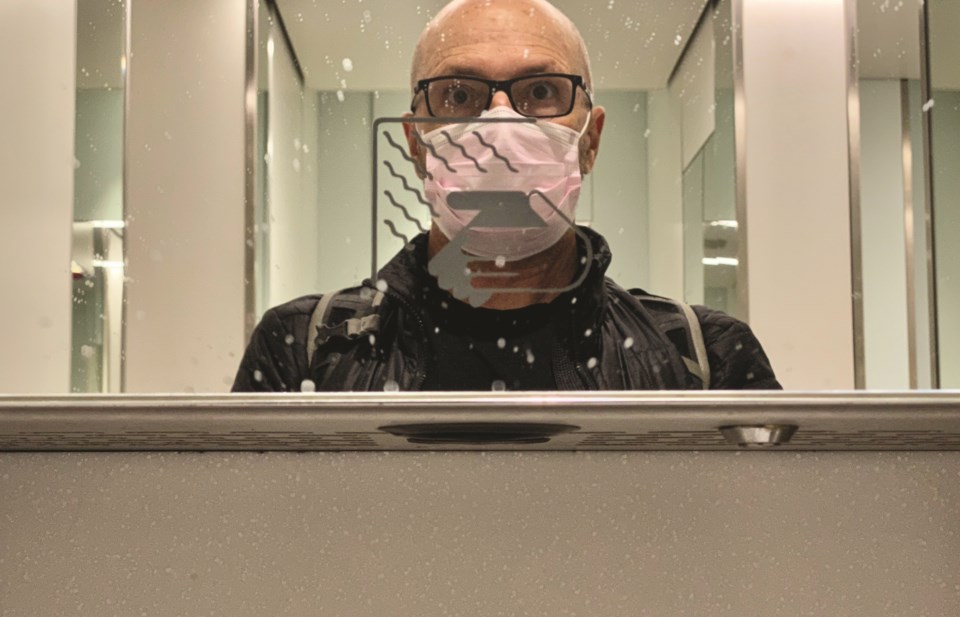The other night, my partner and I popped a bottle of Prosecco to celebrate an anniversary. But not that kind of anniversary. Instead, we were tippling to a year of lockdown, of staying home, of keeping things as small but as interesting as possible. Grateful for living where we do and the opportunities available during a time of restraint, it seemed worth honouring.
It had been exactly a year since my March 7 flight back to Canada from Zurich, chased by the burgeoning pandemic. While there, the COVID-19 bomb had detonated in northern Italy and its fallout spread into Switzerland. Over the two weeks from the day I arrived, the country went from zero cases to more than 300. All of Europe and Scandinavia were similarly on fire.
Fleeing the frontlines with full knowledge of the juggernaut to come, I returned home to find my partner similarly eyeing the horizon, stocked up on food, TP and cleaning supplies, some of which were already no longer available. I also arrived in Whistler with a sense of incredulity: tourists everywhere, zero concern on display, as if no one read the news. And yet, as an international ski resort, it was a virtual certainty coronavirus had been holidaying here for a while. I only needed look over my shoulder at what I’d seen in Europe and a mid-February week in Japan to know that. Having studied the 2003 SARS CoV-1 outbreak, I didn’t need to do the math on SARS CoV-2, didn’t need to hear government advisories or public health platitudes. It was all there in the scientific literature: aerosol transmission, mask-wearing reduced risk of both spread and contraction. My epidemiologist friends all concurred. With a serious skepticism around political motives and interference in any crisis, and scientific training to operate by the precautionary principle, I’d already been masking on public conveyances—including Whistler’s lifts—since mid-January and hadn’t touched a door handle, ATM or payment machine in months. Now, returning from an unexpected hot zone, I voluntarily self-isolated for two weeks, as if I knew a secret. I didn’t make it halfway through before the dominoes started to fall.
The NBA. The NHL. Outbreaks in Colorado. Cases in and around Whistler. First, Aspen, then Whistler Blackcomb, issued statements about gondola “cleansing” and not packing in as many people. Smart and responsible as this was, it also seemed risible. Then, after all ski areas in Switzerland, France, Italy and Norway shut down completely, Alterra Mountain Company and Vail Resorts, North America’s two largest ski-resort companies, closed their stable for a week—pending consideration of how to proceed for the rest of the season. But with the writing already on the wall of the ICU, the “pause” lasted three days before the season ended for good.
Thinking they could just ride it out, folks scrambled into the backcountry or went touring on Whistler Blackcomb. But then bars and restaurants closed and hotels emptied. Physical distancing and 14-day isolations were mandated. Entry to Canada ended for all but citizens, and the border belatedly but thankfully closed with the U.S., where Trumpism had already made the pandemic much, much worse. Inside of a week, the entire capitalist world—along with its mountain playgrounds—had completely melted down.
Seasonal workers by the thousands in Whistler who lost jobs overnight decided to party the place down one last time. Embarrassingly, photos from these idiocies circled the globe on social media. Tourists who’d recently left Whistler now tested positive for COVID-19—as did skiers at several B.C. heli-ski operations. Vail Resorts wisely issued an edict to clear Whistler Blackcomb’s staff housing. In its wake came an exodus like a wartime refugee scenario—save for the ski and snowboard bags. Afterward, everything went quiet.
But then, like a flower pushing up from the mud in spring, stirred hope.
After a deep breath to accept the new reality, Sea-to-Sky residents showed how creative and compassionate they could be: the first hour at all grocery stores was dedicated to elders and the immunocompromised; local distilleries donated hand-sanitizer; people sewed masks at home for healthcare workers; free home delivery of food, beer, and other items kicked in; online grocery-shopping appeared; people swarmed to online meeting apps. Valley dogs couldn’t believe their good fortune—the whole family home, all day, and more walks than they could handle. These positive notes in a time of collapse made it feel everyone was pitching in, like we were a community. We all knew the worst was yet to come, but in a ski town where there’s always hope for a better powder day, there was suddenly hope for a better world.
This became the overwhelming leitmotif for the rest of the year. As we took care of each other, our governments and institutions did their best to take care of us. Sure, there were Covidiots, anti-maskers, antivaxxers and sundry freedom-fighting morons to deal with, but they were largely and rightly ignored (like the conservative rabble who inevitably complain about hiccups inherent in any disaster relief effort, they deserve no soapbox, only a mirror in which to ask themselves what they did to help out). And then there were the heroics of Canada’s frontline workers to cheer, the marvellous adaptations by many local businesses, and the extraordinary efforts of Whistler Blackcomb to give us some kind of summer and now, what has been a wonderful winter plied through the teeth of the COVID-19 storm—a privilege none of us should take lightly, especially given the very real hardships and death toll across the country.
So, Prosecco. From both of us to all of you, happy anniversary, Whistler. It’s not over yet, but it has been a time, eh?
Leslie Anthony is a Whistler-based author, editor, biologist and bon vivant who has never met a mountain he didn’t like.




